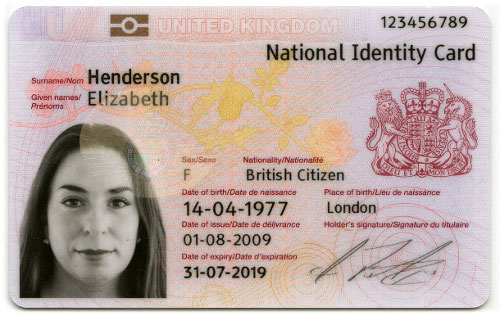ID cards to be scrapped in 100 days

Government starts tricky job of untangling ID cards contracts
The government intends to scrap ID cards for British citizens within 100 days, the Home Secretary Theresa May said today.
It brings to an end the project devised by the Labour government back in 2002, when then Home Secretary David Blunkett touted the biometric identity card as a way of combatting international terrorism. Ambitions for the ID card have shrunk dramatically since then, however. By the scheme's dying days, the cards were being touted as a proof of ID or as a travel document within Europe.
The draft Identity Documents Bill, published today, will put an end to the cards, providing the legislation needed to remove their status as a travel document or proof of ID, dismantle the scheme's back-end databases and cancel contracts with the three ID card suppliers.

The ID card issued to UK nationals will be scrapped within 100 days
(Image credit: Home Office)
These contracts are with CSC to build new IT infrastructure to support application and enrolment for passports and ID cards; IBM to build the central National Biometric Identity Service for storing biometric information for passports and ID cards; and with Thales to provide the infrastructure to supply ID cards to British nationals choosing to get a card before 2012.
Because the CSC and IBM contracts also provide infrastructure for issuing passports they will be largely unaffected by the cancellation of the ID cards scheme. However the government is in negotiation with Thales about winding up its contract.
No part of these contracts will be able to be cancelled or postponed until the Identity Documents Bill passes into law, however.
Home Secretary Theresa May said that the government hopes the bill will pass through Parliament and into law without any hold-ups - a likely outcome given the Lib Dem-Conservative coalition majority in the House of Commons.
"With swift Parliamentary approval, we aim to consign identity cards and the intrusive ID card scheme to history within 100 days," she said in a statement.
Yesterday the Home Office refused to say how much the government will...
...have to pay suppliers in penalty charges to cancel contracts early. Last year the then Labour Home Secretary Jacqui Smith said that these charges would come to £40m.
In contrast, cancellation of the ID cards scheme is expected to save the country £86m over the next four years after decommissioning costs, contract termination and asset write-offs are taken into account, according to the Home Office. The government will also avoid about £800m in ongoing costs over the next ten years, although it was projected that these costs would have been recovered through the fees charged to the public for the cards.
Just under 15,000 of the £30 cards were issued to British nationals since they were made available to select groups of people in October last year, starting with Home Office staff, and subsequently people living in Manchester, and workers at Manchester and City of London airports.
Cards were to be made available to the general public in the UK from 2012 - four years later than the original plan to release the cards in 2008.
The plastic ID cards were printed with a photo of the cardholder and their biographic details, and also had an RFID chip embedded within them, which stored the holder's digital photo and fingerprint scans.
Cardholders' biographic and biometric details were also to be held on a central database called the National Identity Register.
An early version of the database, which was set to go live after 2012, will now be scrapped within one month of the Identity Documents Bill gaining Royal Assent and passing into law.
The database that held the biographic and biometric details of early-adopter Britons who have already obtained an ID card will also be scrapped, and the details held on it destroyed.
ID cards are continuing to be issued to foreign nationals staying in the UK, but are now referred to simply as biometric residence permits. This is possible because the details collected from foreign nationals for ID cards are not stored on the National Identity Register but on a separate database overseen by the UK Border Agency.